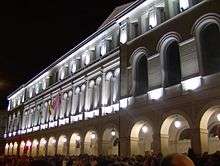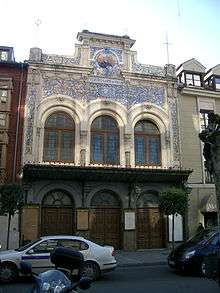Jerónimo de la Gándara
| Jerónimo de la Gándara | |
|---|---|
|
| |
| Born |
1825 Ceceñas, Cantabria, Spain |
| Died | 1877 |
| Nationality | Spanish |
| Occupation | Architect |
| Known for | Lope de Vega Theater, Valladolid |
Jerónimo de la Gándara (1825–1877) was a Spanish architect who designed a number of public buildings during the reign of Isabella II of Spain.[1]
Biography
Jerónimo de la Gándara was born in 1825 in Ceceñas, Cantabria. He was a student of Antonio de Zabaleta. In 1848 he graduated as the first in his class from the Special School of Architecture of Madrid. He undertook further studies in Germany and the United Kingdom, and traveled throughout Europe. He was the first Spanish architect to gain first hand knowledge of the ruins of the Parthenon of Athens, making a drawing of their plans. In 1853 Jerónimo de la Gándara became a teacher in the Madrid School of Architecture, where he became a Professor in 1855 and held academic positions until 1873.[1]
Gándara was a member of the commission that investigated Spanish monuments and reported their findings in the major illustrated book Monumentos arquitectonicos de Espana published by the state in 1859, with text in Spanish and French.[2] In this role, he was involved in excavations, exploring ruins in central Spain that predated the Al-Andalus period, some from the time of the emperor Justinian I and his successors.[3] He resisted pressure to attempt to move ancient mosaics to Madrid from the site in which they were found due to the great difficulty of preserving them intact.[4]
Works

In 1845 Gándara and Aníbal Álvarez Bouquet remodeled the facade of the Senate building.[1] He designed the Teatro de la Zarzuela in Madrid, which was undertaken by José María Sánchez Guallart and opened on the birthday of Queen Isabella II in 1856. It provided a venue for "Zarzuela Theatre", which combines spoken scenes with scenes where the performers sing and dance. The original building burned down in 1909, but Cesareo Iradier later reconstructed it.[5] The theater followed the Italian tradition, with a horseshoe-shaped hall containing three levels of boxes.[6] In 1857 he designed the Palace of the Marquis de Viluma, which opened in 1859.[1]
Jerónimo de la Gándara was the architect of the Lope de Vega Theater, Valladolid, which was inaugurated on 8 December 1861. The facade, restored in 1920, is in the classical style. It has two levels, each with three arches, and a pediment that holds a medallion with the likeness of Lope de Vega sculpted by Ponciano Ponzano.[7] In 1864 he built the pantheon of Manuel Beltran de Lis, Minister of Finance of Isabel II, in the cemetery at the Sacramental de San Isidro.[8] Another major work is the Teatro Calderón de la Barca in Valladolid.[9] One of the largest theaters in Spain, it was designed in an eclectic neo-classical style. The Calderón opened in 1864.[1] In 1867 he constructed the Spanish pavilion for the Universal Exposition of Paris in a strictly Neo-Plateresque style.[10]
Gallery
-

Teatro Lope de Vega, Valladolid
-

Teatro Calderón de la Barca in Valladolid
References
- 1 2 3 4 5 Ceceñas.
- ↑ Société française d'archéologie 1868, p. 357.
- ↑ Gebhardt 1864, p. 559.
- ↑ Rodes 2008, p. 113.
- ↑ Isserlis 2009, p. 408.
- ↑ MobileReference 2007, p. 221.
- ↑ Teatro Lope de Vega.
- ↑ Bermejo 1998, p. 181.
- ↑ Gómez 2001, p. 308.
- ↑ Serrano 2000, p. 88.
- Sources
- Bermejo, Carmen Lorenzo (1998). Arte y arquitectura funeraria: Los cementerios de Asturias, Cantabria y Vizcaya(1787-1936) (in Spanish). University of Oviedo. ISBN 8483170558.
- Ceceñas. "Personajes: Jerónimo de la Gándara". Retrieved 2012-05-27.
- Gebhardt, Victor (1864). Historia general de España y de sus Indias: desde los tiempos más remotos hasta nuestros días... (in Spanish). Libreria española.
- Gómez, Antonio López (2001). Madrid Desde la Academia (in Spanish). Real Academia de la Historia. ISBN 8489512817.
- Isserlis, Steven (2009). Anthem Guide to the Opera, Concert Halls and Classical Music Venues of Europe. Anthem Press. ISBN 1843312727.
- MobileReference (2007). Travel Madrid, Spain: Illustrated Travel Guide, Phrasebook, and Maps (Mobi Travel). MobileReference. ISBN 1605010359.
- Rodes, Concha Papí (2008). Aureliano Ibarra y La Alcudia: Una mirada a la arqueología del XIX (in Spanish). Universidad de Alicante. ISBN 8479088478.
- Serrano, Carlos (2000). Nations en quête de passé: la Péninsule ibérique (XIXe-XXe siècles) (in French). Presses Paris Sorbonne. ISBN 2840501589.
- Société française d'archéologie (1868). Bulletin monumental (in French). 34. Société française d'archéologie, Musée des monuments français.
- "Teatro Lope de Vega". Info Vallodilid (in Spanish). Retrieved 2011-11-10.